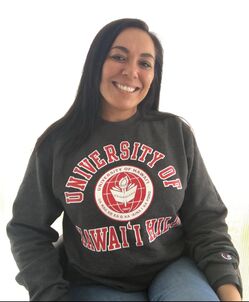Mentorship Program
Implements pre- and post-release mentoring and case management services in partnership with the Hawaii Community Correctional Center (HCCC) program, to increase public safety and reduce recidivism for justice-involved individuals transitioning back into our Hawai`i Island communities.
Hawai'i has an incarceration rate of 487 per 100,000 people (including prisons, jails, immigration detention, and juvenile justice facilities). Our state locks up a higher percentage of our people than many wealthy democracies do. Each year, at least 15,000 different people are booked into local jails in Hawai'i.
Almost all of those currently incarcerated will be released at some point. Yet those returning to their communities face complex challenges and needs: more than 4 in 10 people released from state prisons were reincarcerated within 3 years of their release. In 2016, 14% of those released from state prisons in Hawai`i were women. Research has shown that women returning from custody have "a significantly higher need for services" than men, including economic marginalization and poverty, and trauma and gendered pathways to incarceration.
A mentor can make the difference between a successful return to community or re-offending. This is particularly true in the first few days and weeks after release when a person can feel most overwhelmed. According to a study by Fletcher & Batty (2012), one of the forms of social support most frequently expressed by people released from custody is "a mentor to guide them to make everyday decisions, peers with whom to share struggles, and a support system to hold them accountable for their lifestyle and behavior.”
BENEFITS TO MENTEES
Almost all of those currently incarcerated will be released at some point. Yet those returning to their communities face complex challenges and needs: more than 4 in 10 people released from state prisons were reincarcerated within 3 years of their release. In 2016, 14% of those released from state prisons in Hawai`i were women. Research has shown that women returning from custody have "a significantly higher need for services" than men, including economic marginalization and poverty, and trauma and gendered pathways to incarceration.
A mentor can make the difference between a successful return to community or re-offending. This is particularly true in the first few days and weeks after release when a person can feel most overwhelmed. According to a study by Fletcher & Batty (2012), one of the forms of social support most frequently expressed by people released from custody is "a mentor to guide them to make everyday decisions, peers with whom to share struggles, and a support system to hold them accountable for their lifestyle and behavior.”
BENEFITS TO MENTEES
- A Mentor is genuinely interested in your questions, concerns and struggles. A Mentor listens.
- A Mentor can help you talk through issues and develop personal goals. A Mentor encourages.
- A Mentor helps identify resources and advises on networking opportunities. A Mentor guides.
- A Mentor shares knowledge and life experiences. A Mentor is open and honest.
- A Mentor supports and encourages positive choices that add to taking responsibility for one's lifestyle and behavior, valuing others and oneself, and reaching a successful future. A Mentor advises and inspires.
- A Mentor helps improve the quality and continuity of care by collaborating efforts between the Mentee, service providers, and criminal justice services. A Mentor connects.
|
Jessica Caravalho, GHH Volunteer Mentor
Graduate Student in Social Work, University of Hawai`i at Manoa Being a mentor teaches me to meet people where they’re at. It builds empathy. What better way to help someone than by understanding their circumstances? This is important because the things you learn in school can’t be applied in the real world unless you have understanding and empathy. Learn more about Jessica's experiences and insights as a Mentor. |
BENEFITS TO MENTORS
- Opportunity to have a life-changing impact on someone's life and contribute to building community.
- Learn first-hand experience in coordinating service providers and criminal justice services with Mentee.
- Receive training and on-going support throughout the program.
Community-Based Case Management & Mentoring
GHH's Mentoring Program was established in 2018 by a three-year federal grant from the Office of Justice Programs, Bureau of Justice Assistance, to provide pre- and post-release case management services to justice-involved individuals. Together with an on-going partnership with the State of Hawai`i Department of Safety, the Mentoring Program matches individuals leaving the Hawai`i Community Correctional Center (HCCC) with volunteer mentors. As the benefits are highest with peer mentors, GHH strives to match Mentees with Mentors who have similar life experiences.
The mentor training curriculum was developed by Dr. Joseph Pascarelli, Former President of the International Mentoring Association. Mentors and Mentees receive on-going training and support throughout the re-integration process (see below).
The impact of mentoring for adults returning to their communities from incarceration is influenced by its structure. At Going Home Hawaii, this involves collaborating with correctional facilities, thoughtfully selecting and matching Mentors and Mentees, and effectively concluding the mentoring relationship. Central to the process is the understanding that mentoring supplements the services that address other critical reentry needs, such as housing, health care, substance use treatment, and employment/higher education.
The mentor training curriculum was developed by Dr. Joseph Pascarelli, Former President of the International Mentoring Association. Mentors and Mentees receive on-going training and support throughout the re-integration process (see below).
The impact of mentoring for adults returning to their communities from incarceration is influenced by its structure. At Going Home Hawaii, this involves collaborating with correctional facilities, thoughtfully selecting and matching Mentors and Mentees, and effectively concluding the mentoring relationship. Central to the process is the understanding that mentoring supplements the services that address other critical reentry needs, such as housing, health care, substance use treatment, and employment/higher education.
Be a Mentor
Mentoring is two or more individuals willing to form a mutual, respectful, trusting relationship focused on the potential of the mentee.
MENTOR EXPECTATIONS
** During COVID, all contact between Mentors and Mentees should follow social distancing guidelines, including using Zoom or FaceTime in place of face-to-face meetings. Mentor trainings and support meetings follow social distancing guidelines. **
MENTOR EXPECTATIONS
** During COVID, all contact between Mentors and Mentees should follow social distancing guidelines, including using Zoom or FaceTime in place of face-to-face meetings. Mentor trainings and support meetings follow social distancing guidelines. **
- Help Mentee develop an enhanced sense of self-worth with specific knowledge and skills to increase their chances for personal success.
- Provide support, guidance and assistance to the Mentee as s/he goes through difficult periods, faces new challenges, works to build new skills, and adjusts to life back in the community.
- Be patient and positive.
- Be an active listener and non-judgmental.
- Take pride in one's role as a Mentor and in the Mentee's strengths, abilities and progress.
- Meet face-to-face with Mentee a minimum 1 hour per week for 12 months. (~ 4 hrs./month)
Matched Mentors and Mentees will decide together when and where to meet. - Attend Mentor training on identifying and developing mentoring skills and tools, and on-going supplementary Mentor trainings throughout the year based on Mentors' needs. (~ 1 to 2 hrs./month).
- Minimum six (6) Mentor support meetings per year.
- Minimum two (2) supplementary Mentor workshops per year. - Mentee case manager and Mentor Coordinator will also provide one-on-one support via email or phone (during work hours, unless emergency) and in person by appointment. (~ 1 to 2 hrs./month).
- Maintain a contact log of interactions with Mentee, including face-to-face meetings, phone calls, and email exchanges.
- Keep written notes of Mentee relationship, to track and document Mentee's progress and relationship development.
- Matches will be decided by staff after interested Mentors and Mentees meet and a mixer, after which each will have a chance to indicate match preferences.
MENTOR APPLICANT PREREQUISITES
- Be 21 years of age or older.
- Be employed, enrolled in school or retired.
- Have a current TB test (within two (2) years of date of applying to program).
- Commit to mentoring in-person an individual released from custody for a minimum of one (1) hour per week for one year (12 months).
- Commit to continuing mentor education through through Mentor support meetings and participate in supplementary Mentor workshops.
- Complete and submit a Mentor Application Packet (below). Be sure to include supplementary materials, such as letters of recommendation and resume.
- Take part in an in-person interview so that program staff can get to know you. This helps with matching Mentors and Mentees.
- Agree to a criminal background check. Criminal history will not necessarily disqualify an applicant from becoming a Mentor.
All Mentor personal information, including application materials, are kept confidential.
FOR MORE INFORMATION OR TO APPLY, CONTACT
|
JoNelle Fukushima
Program Coordinator Mentorship Program East Hawai`i Office 80 Pauahi St., Suite #203, Hilo, HI 96720 Tel: (808) 491-2437 Fax: (808) 498-0315 |
Contact Form
|




